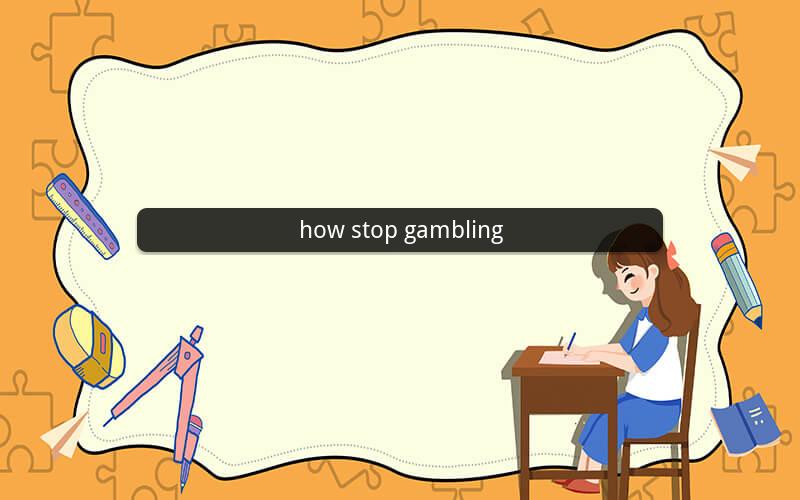
How to Stop Gambling: A Comprehensive Guide
Table of Contents
1. Understanding the Problem
2. Identifying the Reasons for Gambling
3. The Psychological Impact of Gambling
4. Financial Consequences of Gambling
5. Strategies to Control Gambling
6. Seeking Professional Help
7. Support Systems and Community
8. Building a Supportive Environment
9. Techniques for Coping with Cravings
10. Long-Term Recovery and Maintenance
1. Understanding the Problem
Gambling can be an enjoyable pastime for many, but for others, it can become an addiction that disrupts their lives. Recognizing the signs of a gambling problem is the first step towards overcoming it. Signs may include losing track of time, spending more money than intended, and neglecting responsibilities.
2. Identifying the Reasons for Gambling
Understanding why one engages in gambling is crucial. Common reasons include escapism, the thrill of winning, or the desire to improve one's financial situation. Identifying these triggers can help in developing strategies to overcome them.
3. The Psychological Impact of Gambling
Gambling addiction can have profound psychological effects, including depression, anxiety, and a sense of shame. It's important to address these issues to facilitate recovery.
4. Financial Consequences of Gambling
The financial impact of gambling can be devastating. Debts, loss of savings, and potential legal issues can arise from excessive gambling. Addressing these financial concerns is a vital part of the recovery process.
5. Strategies to Control Gambling
Several strategies can help control gambling behavior. These include setting strict budget limits, avoiding gambling environments, and using self-exclusion programs.
6. Seeking Professional Help
Professional help can be invaluable in overcoming a gambling addiction. Therapists, counselors, and support groups can provide guidance and support throughout the recovery process.
7. Support Systems and Community
Building a strong support system is essential. Friends, family, and support groups can offer encouragement and accountability. Joining a community of individuals who have overcome gambling addiction can also be beneficial.
8. Building a Supportive Environment
Creating an environment that discourages gambling is crucial. This may involve removing gambling-related items from the home, avoiding gambling websites, and seeking out hobbies and activities that do not involve gambling.
9. Techniques for Coping with Cravings
Cravings for gambling can be intense. Techniques such as mindfulness, relaxation exercises, and distraction can help manage these cravings.
10. Long-Term Recovery and Maintenance
Recovery from a gambling addiction is a lifelong process. Maintaining sobriety requires ongoing vigilance, support, and commitment to healthy habits.
Conclusion
Stopping gambling is a challenging but achievable goal. By understanding the problem, identifying triggers, seeking professional help, and building a supportive environment, individuals can overcome their addiction and lead a fulfilling life.
10 Questions and Answers
Question 1: Can I stop gambling on my own?
Answer: While it's possible to stop gambling on your own, having professional support and a strong support system can significantly increase your chances of success.
Question 2: How long does it take to recover from a gambling addiction?
Answer: Recovery time varies from person to person. Some may experience immediate relief, while others may need ongoing support for several years.
Question 3: Are there medications that can help with gambling addiction?
Answer: Medications can be used in conjunction with therapy to help manage symptoms of gambling addiction, but they are not a standalone solution.
Question 4: Can gambling addiction affect my relationships?
Answer: Yes, gambling addiction can strain relationships, leading to trust issues, financial problems, and emotional distress.
Question 5: How can I stay motivated during the recovery process?
Answer: Staying motivated involves setting realistic goals, celebrating small victories, and seeking support from friends and family.
Question 6: Is it normal to experience cravings during recovery?
Answer: Yes, experiencing cravings is a normal part of recovery. Learning to cope with these cravings is an important skill.
Question 7: Can I gamble responsibly if I have a gambling addiction?
Answer: No, gambling responsibly is not possible if you have a gambling addiction. The urge to gamble can overcome your best intentions.
Question 8: Are there any legal consequences of gambling addiction?
Answer: While gambling addiction itself is not illegal, the actions taken as a result of the addiction, such as theft or fraud, can have legal repercussions.
Question 9: Can I still enjoy leisure activities if I have a gambling addiction?
Answer: Yes, you can still enjoy leisure activities. The key is to find activities that do not involve gambling and do not trigger cravings.
Question 10: What should I do if I think a friend or family member has a gambling addiction?
Answer: Encourage them to seek help, offer support, and be understanding. Researching resources and support groups can also be beneficial.